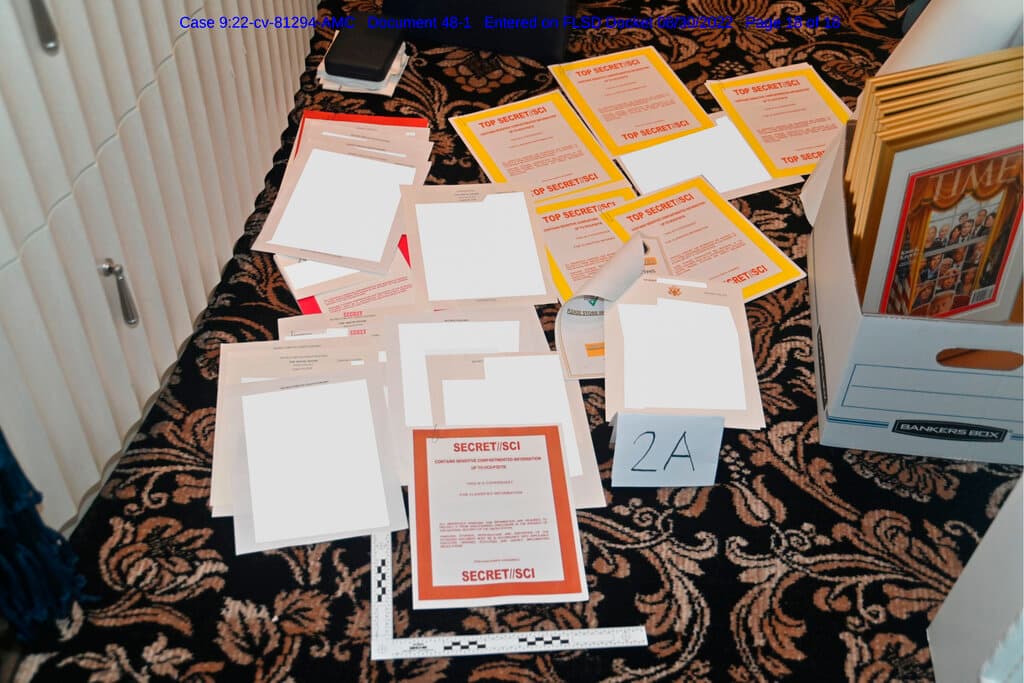The Government Launches a Legal Broadside Against President Trump
The DOJ argues against the appointment of a special master and produces its highest-resolution account of the case against the ex-president.

In the latest round of what is shaping up to be a bruising legal battle over the search at Mar-a-Lago, the Department of Justice blasted “the wide-ranging meritless accusations leveled against the government” and argued against the appointment of a special master sought by President Trump.
In doing so, the Justice Department produced its highest-resolution account of the case against Mr. Trump for retaining classified documents. It included an image showing yellow folders strewn on top of a floor carpet marked “Top Secret” and “Secret” in bright red letters. It is unclear who arranged the documents on the floor.
That filing is in opposition to Mr. Trump’s request for an external referee to sort through the fruits of the search of his home. It was released late Tuesday night. The government might be fighting an uphill battle, as Judge Aileen Cannon has already signaled her “preliminary intent” to name a special master.
In blunt language, the DOJ cites the Presidential Records Act dictate that the “United States has complete ownership, possession, and control” over the documents. It insists that “the former President lacks standing to seek judicial relief or oversight as to Presidential records because those records do not belong to him.”
Insisting that the “appointment of a special master is disfavored in a case such as this,” the government notes that its own internal team has already conducted the very review with which the special master would be tasked. The appointment “would impede the Intelligence Community from conducting its ongoing review of the national security risk that improper storage of these highly sensitive materials may have caused.”
Furthermore, the DOJ argues in respect of privilege that “the former President never asserted executive privilege over any of the documents nor claimed that any of the documents in the boxes containing classification markings had been declassified.” Such claims are likely to be at the heart of Mr. Trump’s defense should the case go to trial.
In detailing its efforts to recover classified information, the DOJ reports that an initial look disclosed “boxes of government records, including 38 documents with classification markings” that “remained at the Premises nearly five months after the production of the Fifteen Boxes and nearly one-and-a-half years after the end of the Administration.”
In the build up to the search, the DOJ claimed that it “developed evidence that government records were likely concealed and removed from the Storage Room and that efforts were likely taken to obstruct the government’s investigation.” That appears to preview potential charges of obstruction, possibly against Mr. Trump.
The raid yielded “thirty-three items of evidence,” including three classified documents found in Mr. Trump’s desk in his “45” office. These included “over one hundred unique documents with classification markings,” some so restricted that “even the FBI counterintelligence personnel and DOJ attorneys conducting the review required additional clearances before they were permitted to review certain documents.”
In pointed language intended to undermine Mr. Trump’s argument that he cooperated with the effort to recover the documents, the filing notes that “the FBI, in a matter of hours, recovered twice as many documents with classification markings as the ‘diligent search’ that the former President’s counsel and other representatives had weeks to perform.”
Turning to Mr. Trump’s request for a special master and for the return of the documents, the government maintains that the one-time president “has no property interest in any Presidential records (including classified records) seized from the Premises.”
If that interest is absent, he does not have standing to petition for their return. He has, the DOJ argues, no “colorable argument that he has a property interest in any Presidential records seized.” If “these records do not belong to” Mr. Trump, the law “gives him no right to have them returned.”
In seeking to fend off a special master, the government points to the two-week delay between the search and the request, noting that such demands are usually filed immediately. Here, it says, the FBI’s own review as well as the disclosure that the “Intelligence Community is also reviewing the seized documents to assess the potential risk to national security” renders such an appointment belated.
As for the special master’s potential review of executive privilege, the DOJ asserts that the Supreme Court has made clear that a former president may not successfully assert executive privilege “against the very Executive Branch in whose name the privilege is invoked.” In addition, Mr. Trump has not formally asserted that privilege.
Framing executive privilege as an executive branch prerogative, the filing argues that “even in a case where records might be withheld from the public pursuant to a valid assertion of privilege, there would not be a basis for withholding them from review by the Executive Branch itself in pursuit of its core executive functions.”
Noting that special masters are usually appointed in searches of law offices, where privilege restrictions are especially salient, the DOJ argues that the “attorney-client privilege issues in this case present none of the complexities associated with a search of a law firm.”
Judge Cannon has called for a hearing Thursday regarding the claim for a special master.

